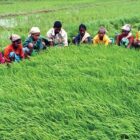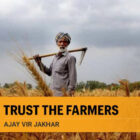If the farmer viewpoints get incorporated into policies, a future where farm children are better off than the quagmire in which their forefathers live may well be possible.
The recent protests in Berlin against industrialised farming and the planned free trade agreement between the European Union (EU) and the United States, under the banner, “We are fed up”, were an important milestone in remonstrations against the current state of affairs around food. As a witness to this call for a worldwide right to food, legal restrictions to protect food and farming, one could not but be touched by the irony of the fact that even as trade issues are resonating across Europe, most Indian farmers are oblivious of the inevitable consequences of trade agreements.
Sometimes policies have the ability to forge unity in communities that have for long remained too disunited for their own good. The question is, will new farm policies in India lead to more restlessness and ultimately unify farmers. Clearly this depends on the government of the day. Given these circumstances, the recent visit of the World Trade Organisation (WTO) chief, Roberto Azevêdo to India, is of great import. He travelled to Jaipur to meet the Confederation of Indian Industry (CII), the advocacy body for Indian industry, to facilitate its lobbying for New Delhi to sign on the dotted line for a trade agreement on farm produce.
Azevêdo, canny and knowledgeable, understands exactly where policies are made and it is for India to be cannier and not abandon its objectives of attaining self-sufficiency in food production. As international commodity prices crash, the decibels for India to open its borders for high value, low volume imports will rise. Of critical importance is for this country not to be swayed by the cultivated cacophony in the name of reforms. Farmers are the most optimistic and receptive people in the world and one feels that this optimism is being finally matched by the government’s keenness to succeed; the question is the road map.
India has lost so many opportunities for unparalleled growth in the last decade that one is reminded of Samuel Beckett’s take on life being a “succession of paradises successively denied”. India’s growth story depends on successes on the farm and farms can only succeed if policies are designed with more mettle than in the past. If the farmers’ points of view are incorporated, one can certainly look forward to a future where today’s children will be infinitely better off than the quagmire in which their forefathers meekly lived in.
The Finance Minister has sought pre-budget consultations on agriculture that were attended by the Chief Economic Advisor to the Prime Minister, secretaries to the ministries of finance, expenditure and agriculture amongst others. The Bharat Krishak Samaj (BKS) presented a list of minor things (available at www.bks.org.in for public scrutiny) such as small investments that chip away the rough edges of policy instead of grand gestures that amount to little.
The memorandum was not for temporary, short-term fixes but for strategically achieving the maximum possible long-term self-sustainability and for family farms to prosper. The memorandum is a pre-requisite for inclusive growth and to control food inflation. Presuming financial constraints for fund allocation, the list focused on core areas of the farm sector that require immediate attention and where the growth dividend will be the largest.
In Germany, 94 per cent of all farmers are members of the national farmers’ organisation, Deutscher Bauernverband (DBV). They pay an annual membership fee that may vary from region to region. A 40-hectare farm, which is the national average farm size, pays around €250 a year. In India, one would be surprised if even one per cent of the farmers pay a farmers organisation an annual membership fee. Sad though this may be, there is no one to blame but the organisations themselves. The German farmers’ organisation has a budget of over €10 million and does influence the EU farm policy. Indian farmers’ organisations, including the BKS, need to do more, be better informed and more vocal in advocating better policies.
Failure to do so would lead to the situation cynically portrayed by a delegate from Africa at the Berlin ‘International Green Week’ conference: “Which month of the year are farmers upset for the least number of days?” The answer is February, the month with the least number of days. If nothing really changes or if policies become more difficult to digest, the time is ripe for farmers to be in perpetual dissent.




